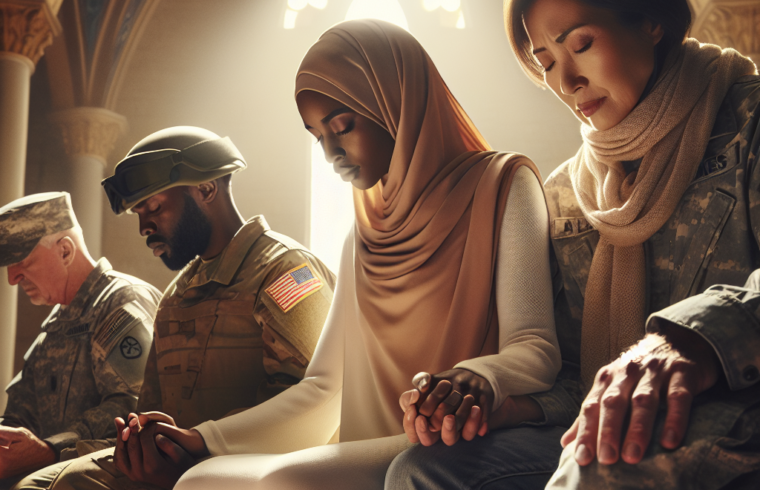==> Thank you for reading this post! Click Here If you are looking for support and Victory over PTSD.
Creating a Safe Space for Veterans
Understanding Their Needs
Let me tell you, understanding the needs of veterans is a game changer. After coming back from service, many vets are wrestling with experiences and emotions that are hard to convey. They might not always talk about their feelings, but providing that safe space where they can voice their struggles is just so crucial. It’s all about active listening, folks. Not everyone’s going to share their stories at first, and that’s okay!
This isn’t just about talking; it’s about creating an environment where veterans feel respected and understood. Sometimes, just sitting quietly with them can mean the world. They want to know that someone cares enough to be present, no questions asked, at least not right away. Trust me, patience pays off!
It’s also important to educate ourselves about military culture. When we understand their background, it helps us relate better and support them more effectively. Empowering our vets means showing them we care about where they come from, and what they’ve experienced along the way.
Incorporating Faith as Support
Faith can be a profound tool for veterans looking for solace. Many veterans find strength and comfort in their spiritual beliefs. When supporting them, acknowledging and embracing that faith journey can be empowering. For some, it might mean attending services together, while for others, it could be as simple as sharing a meaningful quote or scripture.
It’s not just about religion, though—spirituality means different things to different people. I once had a buddy who found his peace in nature and the outdoors instead of a church, and that’s just as valid. By respecting each person’s individual beliefs, we make them feel valued.
Encouraging them to express their spirituality can foster a sense of community. From prayer groups to meditation sessions, there are countless ways to facilitate spiritual connections and growth. This can show veterans they’re not alone on their journey.
Building Community Connections
One of the most powerful things we can do is help veterans connect with community organizations. These groups often share the same goals: providing support, creating social networks, and offering practical resources. The more we can expand their circle of friends, the better they’ll feel.
In my journey, I have seen the tremendous impact of group activities, whether it’s a casual BBQ, a book club, or a sports league. Just getting out there and mingling can help break those invisible barriers. Engaging in recreational activities together opens doors for camaraderie and healing.
Remember, building these connections doesn’t solely benefit the veterans. It enriches the community, too. When I started volunteering, I discovered how much I learned from the vets. Their stories are impactful and instructive, deepening my understanding of sacrifice and resilience.
Utilizing Resources for Healing
Accessing Mental Health Resources
Let me tell you—a focus on mental health resources can be a life-saver for many veterans. Navigating the complexities of post-service life isn’t a walk in the park, and having access to the right therapists, counselors, and support networks can make all the difference. I’ve seen firsthand how much the right mental health professional can provide relief.
Many veterans shy away from seeking help due to stigma, but talking openly about how we feel can be so empowering. I often share my experiences with therapists and how they’ve helped me see the world differently, which can encourage veterans to reach out themselves.
It’s key to stay informed about local and national resources available for veterans. There are numerous organizations that specialize in mental health services tailored for veterans’ unique situations. Facilitating access to these resources can ease their journey toward healing.
Physical Wellness and Activities
Let’s not forget about physical wellness—after all, it’s not just about the mind. Engaging in physical activities like yoga, hiking, or even just walking can contribute tremendously to a veteran’s mental health. Personally, I’ve found that getting my body moving often helps clear my mind.
Creating opportunities for physical wellness can also be a bonding experience. Imagine setting up a weekly sports game or a hiking group—everyone benefits from both the activity and the social aspect. We laugh, we compete, and we share stories. It’s a simple but powerful way to show support.
Additionally, teaching veterans about nutrition and healthy living can have an enormous impact. Our bodies and minds are intertwined, and fueling them with the right food can lead to better mental clarity and emotional balance.
Spiritual Retreats and Workshops
Another resource that’s often overlooked are spiritual retreats and workshops. These can offer veterans a space to reconnect with themselves and their faith. When attending a retreat, you get to step away from daily stresses and really dive deep into personal reflection.
Working together in a guided environment can help veterans discover tools to process their experiences and foster spiritual growth. I can’t stress enough how valuable it is to have that time in a supportive setting, where they can learn from each other.
Get Support and Help with Recovery! Visit us for more Information and Support
These retreats often provide activities such as meditation, mindfulness practices, and group discussions. All of these can contribute to a greater sense of peace and fulfillment, reminding veterans that they’re not alone and that they matter.
Encouraging Open Conversations
Creating Platforms for Dialogue
Sparking open conversations about faith and healing can lead to profound changes for veterans. When we create platforms for dialogue—whether it’s through organized events, forums, or buddy systems—we empower veterans to freely share their feelings and beliefs.
In my experience, the most healing conversations often happen in relaxed settings—like around a campfire or while grabbing a coffee. You’d be surprised how a laid-back atmosphere encourages deeper dialogues.
Eliciting these discussions can lead to increased awareness about the struggles veterans face, and it promotes understanding within families and communities. Everyone, including their loved ones, can learn to communicate better and provide more effective support.
Encouraging Vulnerability
It’s vital to remind veterans that it’s okay to be vulnerable. Society often places undue pressure on us to appear strong, yet acknowledging our feelings is a sign of strength. Sharing personal struggles, I often find that I’m met with similar experiences from others. Opening up makes the journey less lonely!
When veterans see others being vulnerable, it can encourage them to do the same. I’ve had many friends open up about their experiences only after I’ve been honest about my own struggles. Being real helps break down those walls of isolation.
Creating a culture of vulnerability within groups shows that it’s completely okay to seek help and to lean on each other. This support system can be the anchor they need when navigating life after service.
Balancing Personal Stories and Experiences
Lastly, as we encourage conversations, it’s vital to balance personal stories with active listening. Everyone has a unique journey, and sharing experiences can foster deep connections. However, it’s equally important to let veterans share their stories without turning conversations into a competition of who had it worse.
For me, storytelling has been a powerful bonding experience. When veterans can share their experiences without fear of judgment, it creates mutual understanding and respect. Finding that balance is key.
Engaging in dialogues that honor both storytelling and listening helps create a nurturing environment. It allows us to support each other while sharing what we’ve learned along our respective paths.
Conclusion: The Role of Faith in Healing
In summary, supporting veterans through faith can pave the way for immense healing and personal growth. Whether it’s creating safe spaces for dialogue, accessing mental health resources, building community connections, or encouraging vulnerability, each aspect plays a critical role in their journey.
By embracing the importance of faith and spirituality, we cultivate an enriching environment where veterans feel both supported and empowered. It’s a beautiful way to remind them they’re not alone—and we all have a role to play in that narrative.
Frequently Asked Questions
1. Why is creating a safe space important for veterans?
Creating a safe space allows veterans to feel respected and understood, encouraging them to share their feelings and experiences without fear of judgment.
2. How can faith support veterans in their healing journey?
Faith can be a source of strength for veterans. Embracing their spiritual beliefs can provide comfort, encouragement, and a sense of community.
3. What are some effective activities for building community connections?
Group activities like BBQs, book clubs, or sports leagues foster camaraderie and help veterans feel connected and supported.
4. Why should veterans seek mental health resources?
Accessing mental health resources can provide vital support for veterans dealing with the complexities of post-service life, aiding in their emotional healing.
5. How can open conversations help veterans?
Encouraging open dialogue fosters mutual understanding, supports emotional sharing, and promotes strong connections between veterans and their communities.













